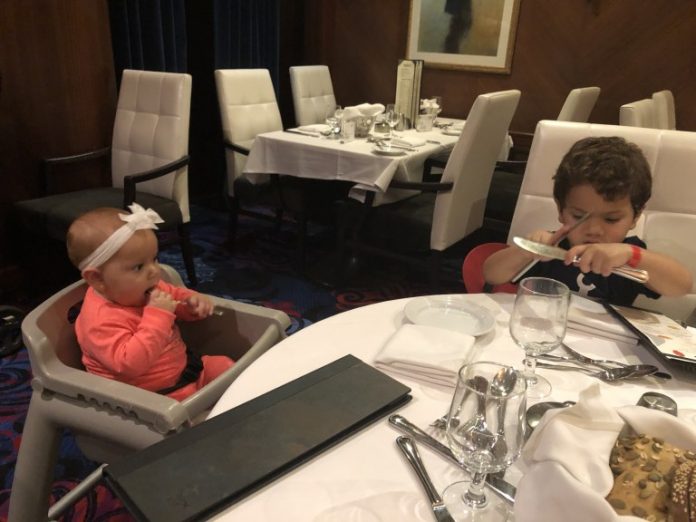It’s summer and that means travel plans that have been months in the making are ready to launch. As a parent of two kids under five, I know firsthand the stress that comes along with mealtimes while traveling with little ones. This can be especially tricky when you have picky eaters.
So we’ve put together some helpful tips on how to help you and your young food critics when traveling. Follow these recommendations to ease the stress and manage the inevitable meltdowns that will come with mealtimes while on vacation.
- Prep your child before you travel. If you’re planning on going somewhere with a specific type of cuisine, read books, look at videos, cook dinners or try a similar restaurant before you leave for your trip. This will prepare your child and decrease any food-related anxieties that he/she might encounter. Books like “I Can Eat That” and “What’s Cooking” by Joshua D. Stein can be great conversation starters for you and your children about food.
- Do some research on what’s available for you and your children to enjoy. Plus, being around other kids who are curious about trying new foods might just be what your child needs. For example:
– Nibble + Squeak is a website dedicated to hosting dinners for parents with little ones. They pair up with restaurants to host private events that allow families with kids to relax and enjoy a meal, in a welcoming and worry-free environment. They have hosted events all over the US as well as London and Hong Kong.– If you’re heading to a resort type of destination, check to see if they offer family cooking classes and/or kids’ classes. Resort chains like The Four Seasons and Marriott have options at different locations around the globe. You just have to check their websites or give your concierge a call. - Make mealtimes a family activity and practice what you preach. Have the whole family try new foods together. Refrain from using words like ‘yucky’ and ‘eww’ to describe foods. Instead, talk about how foods look like, feel, or what they remind you of. Involve the whole family and make it fun. Be food detectives together!
- Look for opportunities for hands-on activities with food. While vacationing in Koh Samui, my husband and I had the best time learning how to make authentic Thai food. The cooking class also included a guided trip to the local market. This is perfect for kids who need a little push getting out of their comfort zone to experience some sensory play with food. So, roll up your sleeves, cook and explore new foods together.
- NO skipping meals. Schedules might be hectic, especially on travel days, but just like we need to respect nap times, we should do the same with meal times. When uncertain of when and where you’ll be able to eat, carry preferred snacks and drinks. Often times, having your child’s preferred crackers or even just their favorite cup will make on-the-go mealtimes much more comfortable.
- Do not, I repeat, do NOT revolve your family’s vacation meals around your picky eater’s preference. I never recommend this practice as a daily routine, so I definitely don’t advise doing so when traveling. Instead, you could rotate and allow each family member one day when they get to decide where or what type of food they want to eat. This way, everyone gets a turn.
- Don’t bribe or negotiate. It’s a slippery slope once you start offering tit for tat around mealtimes. Instead, offer choices and go for smaller portions (appetizers or kid’s menu). The ability to make choices offers your child some sense of control in an unfamiliar environment. Smaller portions offer a better opportunity for success with finishing a meal.
- Meltdowns will happen and it’s going to be OK. With my firstborn, I used to dread public tantrums. Then one day, while on a weekend getaway, I came across a blogger who wrote about the train analogy in relation to meltdowns. Curious and intrigued, I read the whole article. Little did I know the next day I would be putting it to the test. It was breakfast time and we were seated on the restaurant’s patio. For some reason, my son did not want to sit down to eat. The chair was lava to him. Well, no better time than the present to put this train analogy method into practice. So I sent my husband off to grab his food and I sat there drinking my coffee, while my son had a category 5 meltdown in front of everyone. To my surprise (and relief) it only lasted about 10 minutes. After he finally calmed down, I picked him up and we were able to regroup and join the breakfast festivities while seated peacefully in the high chair. The analogy says that emotions are tunnels and we are trains going through them. We NEED to keep moving all the way through to the other side. However, as parents, we often want to stop the meltdown train before it has reached the other side of the tunnel. We want our kids to calm down as quickly as possible. But they can’t until they reach the other side. So, order a glass of your favorite wine and enjoy the train rides. https://pickanytwo.net/the-train-analogy-that-will-change-how-you-see-your-crying-child/
- As a rule of thumb, make sure your kids get at least one good healthy meal a day and offer lots of liquids throughout. Do not fret over making sure your children eat three big meals each day. This will only cause unnecessary stress for both you and your kids.
- Make it exciting and don’t stick to only sit-down meals. Traveling should be a chance for our senses to explore new sights, sounds, smells and tastes. So use every opportunity to indulge in some taste of local favorite bites. Street eateries, farmers’ markets, and fairs are all low key places (kids can be noisy and move around) that offer great food options. And since these places are informal, you and your family can relax while enjoying your meal, instead of constantly having to worry about everyone sitting quietly in their chairs.
ABOUT CINDY HERDE
I was born and raised in Aruba, which fostered my fluency in four languages and my passion for the language arts.
 After graduating with my master’s degree from the University of Central Florida – GO KNIGHTS! – I had the opportunity to move around the country and work in Orlando, Boston, and Chicago, before settling in sunny Miami with my husband and 2 kids. At each of these career stops I was fortunate to be part of extensive pediatric medical teams, working closely with and learning from fellow speech therapists, physical therapists, occupational therapists, nutritionists, lactation consultants, pediatricians, gastroenterologists, neurologists, early developmental specialists, respiratory therapists, behavior analysts, nurses, special education teachers and of course, parents and caregivers.
After graduating with my master’s degree from the University of Central Florida – GO KNIGHTS! – I had the opportunity to move around the country and work in Orlando, Boston, and Chicago, before settling in sunny Miami with my husband and 2 kids. At each of these career stops I was fortunate to be part of extensive pediatric medical teams, working closely with and learning from fellow speech therapists, physical therapists, occupational therapists, nutritionists, lactation consultants, pediatricians, gastroenterologists, neurologists, early developmental specialists, respiratory therapists, behavior analysts, nurses, special education teachers and of course, parents and caregivers.
Throughout my career I’ve enjoyed being an advocate for families whose primary language is not English, and treasured the opportunities that I’ve had to help these and multiple other families along their feeding journey.
However, becoming a parent in the spring of 2015 completely transformed my career perspective and approach. I now understand the anxieties and concerns that come with parenthood, and it has allowed me to become a different type of clinician… one who’s more empathetic and focused on educating families and providers. Spurred by this new found passion, and armed with 14 years of pediatric field experience, I’ve decided to venture into a new approach to therapy.
By Cindy Herde

















